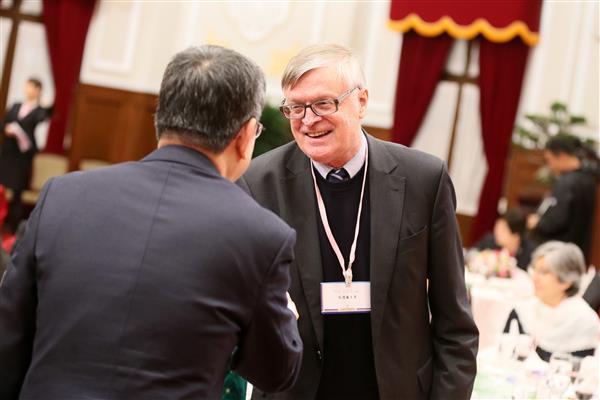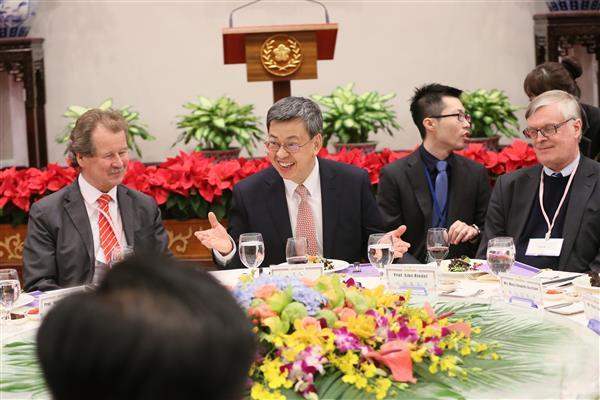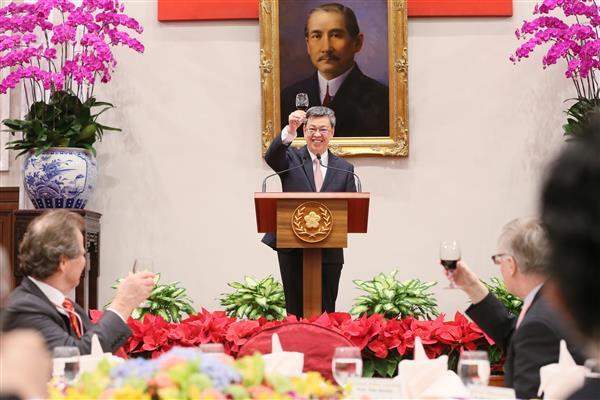News & activities
 News releases
News releases
2017-01-15
Vice President Chen hosts a banquet for members of international review committee for second national reports of ICCPR and ICESCR
On the evening of January 15, Vice President Chen Chien-jen hosted a dinner banquet for members of the international review committee for the Second National Reports of the International Covenant on Civil and Political Rights (ICCPR) and the International Covenant on Economic, Social and Cultural Rights (ICESCR). In addition to extending a cordial welcome to the members who had traveled all the way here, the vice president also expressed hope that they would offer concrete recommendations to help Taiwan build up more complete mechanisms to protect human rights.
In remarks, Vice President Chen stated that safeguarding human rights is very much integral to our government's policy. Even though Taiwan cannot deposit its instruments of ratification for the ICCPR and the ICESCR with the United Nations due to international circumstances, we still signed these two covenants back in 1967, ratified them in 2009, and passed an act to implement them. In line with the requirements established by the United Nations Human Rights Committee and UN Committee on Economic, Social and Cultural Rights, Taiwan carefully designed a set of procedures for reviewing national reports that is different from the one adopted by UN members. This demonstrates Taiwan's willingness and commitment to meet the requirements of the two covenants and fulfill its international human rights obligations. Taiwan's efforts on this front are meant to protect these universal values, contribute our part as a member of the international community, and rally more people around these ideals.
The vice president noted that according to the Act to Implement the ICCPR and the ICESCR, the government is required by the two covenants to establish a national reports system. With concerted efforts by the members of the Presidential Office Human Rights Consultative Committee and government agencies, Taiwan's second national reports were published in April 2016. He then sent out invitations in May to international human rights experts, of whom ten kindly agreed to come to Taiwan and serve on the international review committee. The vice president noted that on the following day (January 16), the group of experts would commence three days of meetings to review our second national reports, and would present their concluding opinions and recommendations on January 20. Vice President Chen expressed confidence that the experts would offer insightful and constructive recommendations for human rights development in Taiwan.
The vice president also mentioned that Taiwan has proactively implemented international human rights standards and taken an innovative approach to reviewing its national reports. This won accolades from the reviewers of the initial national reports, who even suggested that Taiwan's model, which features wider political and public participation, would be a valuable reference for the UN. This is a historic milestone for human rights development in Taiwan, he said. Vice President Chen then extended his heartfelt appreciation to the world-renowned human rights experts, who despite the long travels have come to help Taiwan review its second national reports.
The vice president emphasized that Taiwan is a democracy that is on the path toward transitional justice. The next step will be to consolidate its democracy and entrench the values of human rights. Therefore, he encouraged government officials and human rights advocates alike to redouble their efforts and make Taiwan the most mature society in the Chinese-speaking world in terms of democracy, the rule of law, human rights, and freedom. He also hoped that through the regular publication of our national reports on the ICCPR and the ICESCR and the holding of international review meetings, Taiwan will gradually build up a comprehensive system for national reports.
Vice President Chen then expressed hope that after reviewing the current human rights situation and inadequacies in Taiwan, the experts would offer concrete recommendations for improvement. He also hoped that they will work with our civic groups to monitor the implementation of government policies to build up a well-round human rights protection mechanism, so that the results of human rights development will be shared by all our people.
Among those attending the dinner banquet were Executive Yuan's Minister without Portfolio Lin Mei-chu (林美珠), Minister of the Interior Yeh Jiunn-rong (葉俊榮), and Minister of Justice Chiu Tai-san (邱太三).
In remarks, Vice President Chen stated that safeguarding human rights is very much integral to our government's policy. Even though Taiwan cannot deposit its instruments of ratification for the ICCPR and the ICESCR with the United Nations due to international circumstances, we still signed these two covenants back in 1967, ratified them in 2009, and passed an act to implement them. In line with the requirements established by the United Nations Human Rights Committee and UN Committee on Economic, Social and Cultural Rights, Taiwan carefully designed a set of procedures for reviewing national reports that is different from the one adopted by UN members. This demonstrates Taiwan's willingness and commitment to meet the requirements of the two covenants and fulfill its international human rights obligations. Taiwan's efforts on this front are meant to protect these universal values, contribute our part as a member of the international community, and rally more people around these ideals.
The vice president noted that according to the Act to Implement the ICCPR and the ICESCR, the government is required by the two covenants to establish a national reports system. With concerted efforts by the members of the Presidential Office Human Rights Consultative Committee and government agencies, Taiwan's second national reports were published in April 2016. He then sent out invitations in May to international human rights experts, of whom ten kindly agreed to come to Taiwan and serve on the international review committee. The vice president noted that on the following day (January 16), the group of experts would commence three days of meetings to review our second national reports, and would present their concluding opinions and recommendations on January 20. Vice President Chen expressed confidence that the experts would offer insightful and constructive recommendations for human rights development in Taiwan.
The vice president also mentioned that Taiwan has proactively implemented international human rights standards and taken an innovative approach to reviewing its national reports. This won accolades from the reviewers of the initial national reports, who even suggested that Taiwan's model, which features wider political and public participation, would be a valuable reference for the UN. This is a historic milestone for human rights development in Taiwan, he said. Vice President Chen then extended his heartfelt appreciation to the world-renowned human rights experts, who despite the long travels have come to help Taiwan review its second national reports.
The vice president emphasized that Taiwan is a democracy that is on the path toward transitional justice. The next step will be to consolidate its democracy and entrench the values of human rights. Therefore, he encouraged government officials and human rights advocates alike to redouble their efforts and make Taiwan the most mature society in the Chinese-speaking world in terms of democracy, the rule of law, human rights, and freedom. He also hoped that through the regular publication of our national reports on the ICCPR and the ICESCR and the holding of international review meetings, Taiwan will gradually build up a comprehensive system for national reports.
Vice President Chen then expressed hope that after reviewing the current human rights situation and inadequacies in Taiwan, the experts would offer concrete recommendations for improvement. He also hoped that they will work with our civic groups to monitor the implementation of government policies to build up a well-round human rights protection mechanism, so that the results of human rights development will be shared by all our people.
Among those attending the dinner banquet were Executive Yuan's Minister without Portfolio Lin Mei-chu (林美珠), Minister of the Interior Yeh Jiunn-rong (葉俊榮), and Minister of Justice Chiu Tai-san (邱太三).
Related News
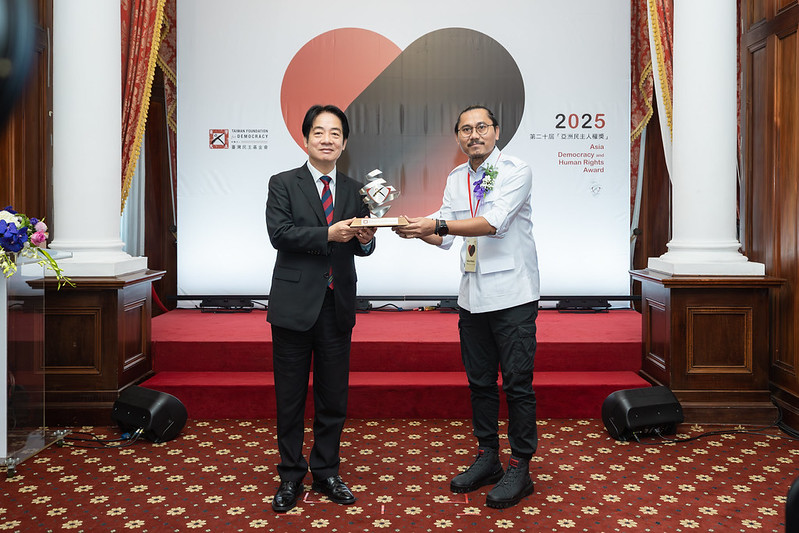
2025-12-10
President Lai attends 2025 Asia Democracy and Human Rights Award ceremony
On the morning of December 10, President Lai Ching-te presented the 2025 Asia Democracy and Human Rights Award to the Indonesian Legal Aid a...
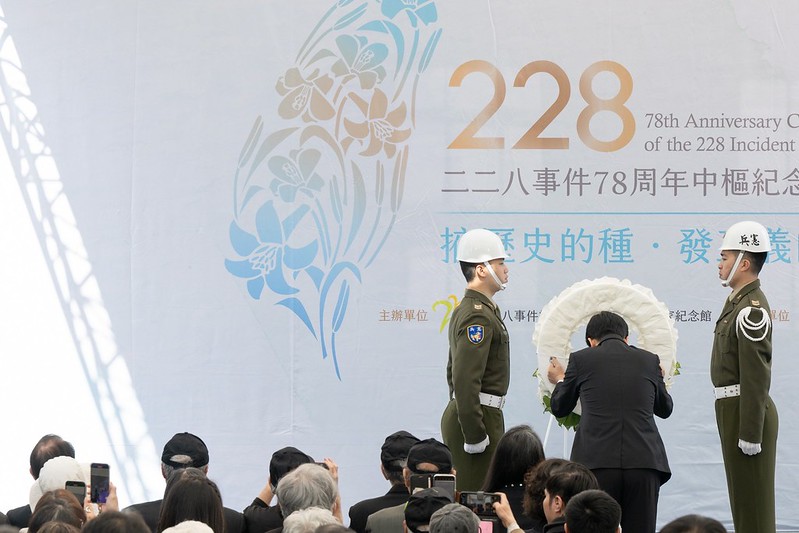
2025-02-28
President Lai attends ceremony marking 78th anniversary of 228 Incident
On the morning of February 28, President Lai Ching-te attended the nation’s main memorial ceremony marking the 78th anniversary of the...
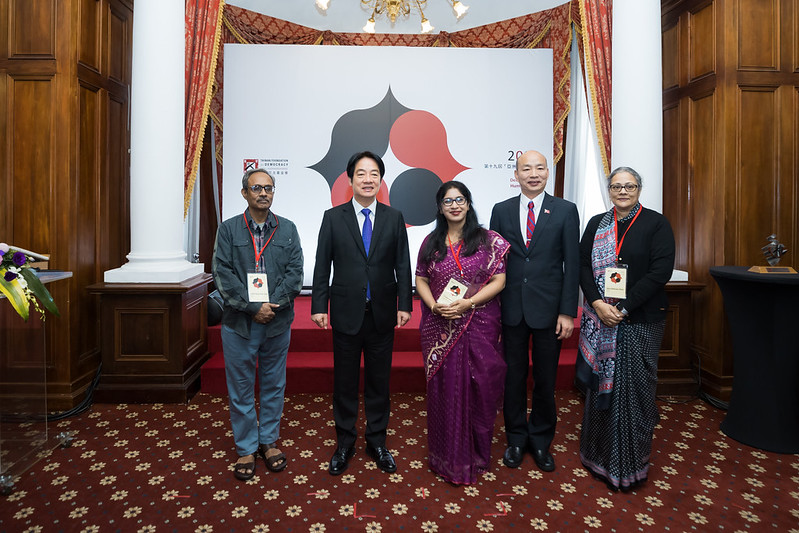
2024-12-10
President Lai attends 2024 Asia Democracy and Human Rights Award ceremony
On the morning of December 10, President Lai Ching-te presented the 2024 Asia Democracy and Human Rights Award to Bangladesh-based human rig...
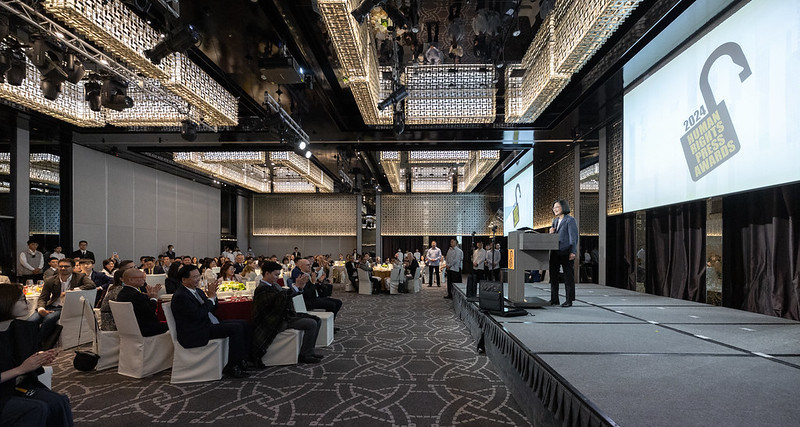
2024-05-10
President Tsai attends 2024 Human Rights Press Awards ceremony
On the evening of May 10, President Tsai Ing-wen attended the 2024 Human Rights Press Awards ceremony. In her remarks, President Tsai thanke...
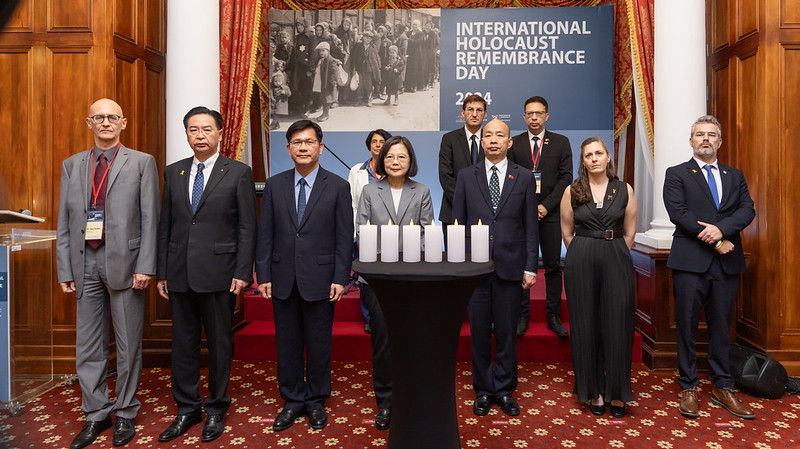
2024-04-17
President Tsai delivers remarks at International Holocaust Remembrance Day event
On the afternoon of April 17, President Tsai Ing-wen attended an International Holocaust Remembrance Day event and delivered remarks, in whi...



